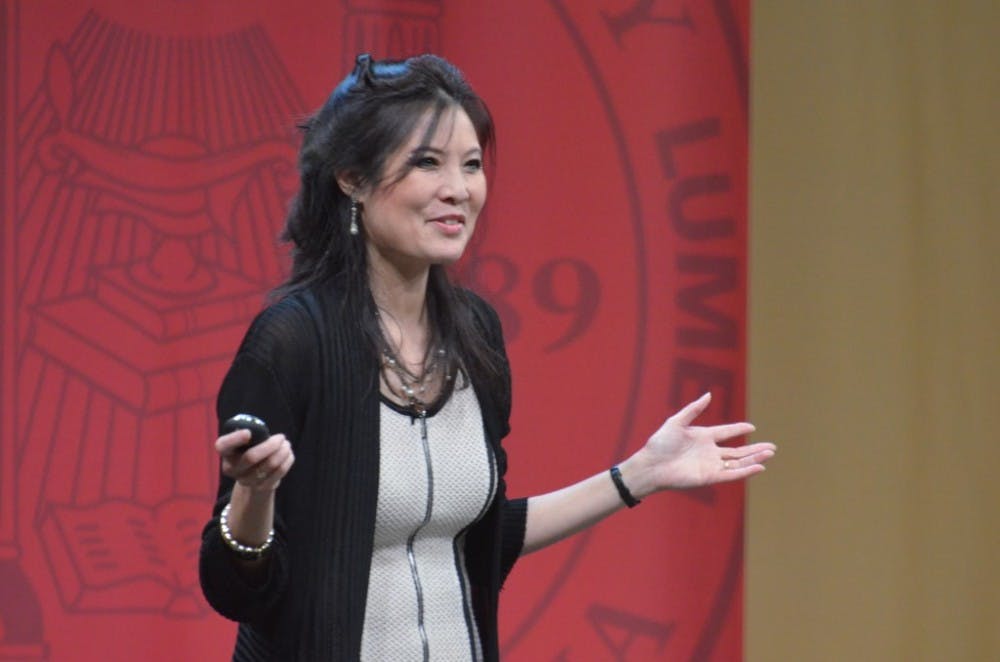The best investment human beings can make is in one another, said the Pulitzer-prize winning, journalist-turned-something-more couple of Nicholas Kristof and Sheryl WuDunn, at Elon University’s Fall Convocation 2014.
Together, they’ve seen it all – children starving in Africa, teenage girls sold into the sex trade in Asia and children left to die in their own U.S. neighborhood. Together, they’ve co-authored four books – three best-selling, one recently-released. And, together, they’re trying to change the world.
It’s all too easy to fall prey to apathy, to doubt what one in seven billion can do to cure cancer or solve hunger or end war, WuDunn said. But the littlest, least-expensive things – a $3.50 pill to kill intestinal worms to keep African kids in school, a $40 surgery to fix a painful disease that leads to blindness – can make the biggest difference in lives a hemisphere away.
But the world's deepest-rooted problems may be ones money can’t solve.
“Disadvantaged kids though are at risk not just because of lack of money,” WuDunn said. “There’s a whole ecosystem, a paradigm around, what creates their lack of opportunity.”
To WuDunn and to Kristof, that paradigm starts with society doing too little, too late to help children who face uphill lives from birth.
Jessica was one such child the couple knew. Described by WuDunn as the face of poverty, the middle-schooler had all the chips stacked against her – an empty fridge in a falling-apart house, watched over by an addled and addicted mother. By sixth grade, Jessica was already drinking; she was expelled for brining alcohol into school.
She scavenged scraps of food together, fueling her growing body by stealing from neighbors’s fridges. Even if Jessica received help, WuDunn said, it wouldn’t have been in time.
“One of the reasons why we have persistent intergenerational poverty is that we probably intervene too late,” she said. WuDunn added that the wealth inequality, especially in the United States, isn’t helping matters, with the top 10 percent of U.S. earners taking home more than half the country’s wealth in 2012.
For Jessica, it was too late – too late to stop her from being raped by her mother’s boyfriend as a seventh-grader, too late to stop her from running away from home. Police found her curled in a dirty ball in a neighbor’s yard, clutching onto the last thing left she could: a puppy.
It’s easy to identify tragic examples that make people’s toes curl and heart race, according to Kristof, now a New York Times columnist, but it’s hard to do something about them. And the reward isn’t always great.
“It’s true that helping people is harder than it looks, and I think that anybody who has tried these efforts has had their heart broken,” Kristof said.
Though “talent is universal, but opportunity is not,” to Kristof, there are those who associate poverty with a lack of trying. Overcoming such stereotypes drove him to journalism in the first place.
“One of the challenges, I think, in overcoming this empathy gap, if you will, is that we’re not always great at telling the stories that lead people to bridge those gaps,” he said.
For senior Omolayo Ojo, a little less abstract and a little more practicality could have fostered a stronger call to action and left her with more to take away from the afternoon.
“I wish that I would have came away with more concrete, definite items,” Ojo said. “I didn’t feel like I walked away with enough action points to help these problems.”
To her, the talk skipped across the audience on a “surface level.” Though the couple mentioned Elon – notably WuDunn asking the crowd whether their daughter, a high school senior, should apply to Elon University, which led to the loudest cheers of the event – the majority focused more on broader issues with implications more global.
No matter the form it takes, it doesn’t hurt that giving has been proven to be good for you, Kristof said. And college students, even ones without massive checkbooks, can help in their own way.
“Our help can indeed ripples through other people’s lives in this long continuum,” WuDunn said.
It made sophomore Chann Little think, and think hard.
“It was motivational,” Little said. “I never knew what you could do for someone, what an impact you could make on someone’s life. It makes me want to go do it.”


